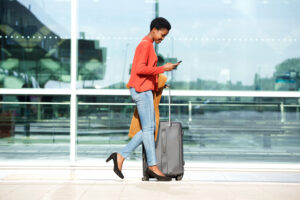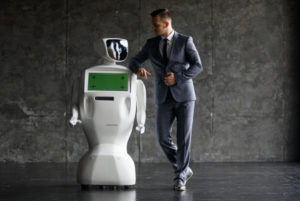What Technology Should Hotels Be Focusing On in 2023

Mobile technology is in high demand and hotels are making the investment in an effort to improve hotel operations and to offer guests the technology experience that they want. Verizon’s 2022 Connected Hospitality Experience Study found that 86% of guests prefer self-service/contactless check-in. Mobile key/keyless entry, mobile apps, kiosks for check-in/check-out, and smart TVs with mobile capabilities are expected to become more widespread. 95% of hotel operators believe that guest facing mobile devices demanding on-premise connectivity will increase. 81% of hotel operators also believe that attracting employees will become more difficult. Hotels have their hands full dealing with the current labor shortage, rising wages and the increasing rates at which employees are leaving hotels. Hotels are now tasked with adopting the right technology to fill the gap caused by the labor shortage and to keep up with the increasing demand for digitization.
Mobile Technology to Enhance the Guest Experience
Mobile Check-in/out
Mobile check-in is highly popular and hoteliers are expected to increase their investment in 2023 and beyond. Mobile check-in allows guests to check in from anywhere prior to arriving at their hotels. After guests make a reservation, they will receive a link via text or through email requesting that they complete the check in process. The link allows guests to upload their ID cards, to enter their credit card information and to provide their signatures virtually. Guests can skip the front desk and go directly to their rooms without the need to fill out additional paperwork or to wait in line.
Mobile Key
The use of mobile key is expected to become even more widespread, mobile key provides key less entry that allows guests to unlock their guest rooms with the use of their mobile devices, instead of the use of traditional key cards. Once guests have completed the mobile check in process, they will then be notified when their mobile keys have been activated. Mobile key works with Bluetooth technology and once enabled will allow guests to use their phones or personal devices to unlock guest rooms.
Room Control Apps
Guests have an expectation of mobile technology during their hotel stays and are more likely to stay at hotels that offer self-service technology. Hotel branded apps offer guests more control of their guest room experience and allow guests to use their mobile devices to control the lighting, the window shades/curtains, the room temperature and the in-room entertainment.
Smart TVs
Guests are in favor of using their mobile devices to control their hotel experience, smart TVs allow guests to operate the hotel TV with their smartphones and other personal devices. The TV system enables guests to access real-time information regarding their stay, as well as access restaurant menus and tourist attractions. Guests can also access popular streaming services such as Netflix and access in-room dining, housekeeping services, guest billing and other hotel services. Smart TVs also allow guests to check-out directly from the hotel TV.
Hotel Technology to Fill Gap in Labor Shortage
Robotics
The adoption of robots offer hotels an efficient and cost-effective solution to the current staffing shortages and allows hotel operators to do more with less resources. Hotels can utilize cleaning robots to fill the gap in housekeeping services, concierge robots can offer guests information about hotel services, amenities and tourist attractions and delivery robots have the ability to work around the clock to make room service deliveries and other guest requests. The use of robotics has increased in the Hospitality Industry, according to a recent report by MarketsandMarkets, the global market for hotel robots is expected to grow from $79 million in 2020 to $338 million by 2025, at a compound annual growth rate (CAGR) of 32.8%.
The Hospitality Industry is currently facing a major labor shortage, according to the AHLA’s September 2022 survey, 87% of hotels were experiencing staffing shortages and 36% considered those shortages to be severe. 43% of hotels were finding it most difficult to hire housekeepers, forcing some hotels to reduce housekeeping services. Hotels have been investing in hotel technology as a means of easing the labor shortage, mobile technology such as mobile check-in and mobile key and self-service check-in via kiosks automates tasks normally done by front desk staff, such as recording guest information and taking payments. Guest messaging allows hotels to provide guests with information, such as housekeeping status updates and allows guests to make reservations without the need to contact the front desk.
Strengthen Network Infrastructure
Reliable Wi-Fi helps hotels to perform more efficiently and allows employees to better handle guest requests. Guests have high entertainment expectations from their hotel experience, guests want to utilize Wi-Fi to stream content from popular subscription providers like Netflix and Amazon and cast entertainment from their personal devices to the hotel’s TV. A powerful Wi-Fi network is essential in implementing mobile technology and other hotel technology that are in high demand. Only 25% of hotel operators are satisfied with their ability to manage peak network traffic and 32% are satisfied with the availability of network bandwidth. The upgrading of networks will be crucial in supporting hotel technology that is dependent on the hotel network.
5G
33% of hotel operators are satisfied with application response times, 5G will allow hotels to resolve most of the issues affecting their network. 5G is the fifth generation of mobile broadband intended to replace the current 4G technology and availability is expected to become widespread in the near future. 5G will allow for bigger channels to speed up data, lower latency to be more responsive and the ability to connect multiple devices at once. The implementation of 5G will allow hotels to cater to guests’ expectations of instant connectivity and will ensure that there is sufficient bandwidth to meet the demand.
Verizon’s Connected Hospitality Experience Study found the following based on the comfort level of hotel operators:
Manage peak network traffic: 25%
Mobile security: 28%
Network and IT security: 29%
Availability of network bandwidth: 32%
Payment security: 33%
Application response time: 33%
Ease of maintaining network: 33%
Network downtime: 41%



